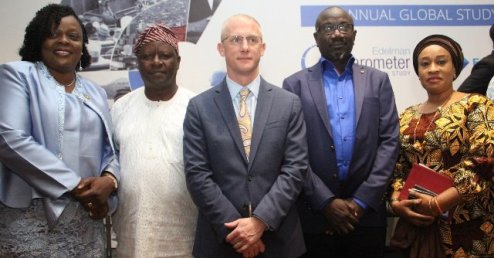72% Of Nigerians Rank Trust In An Organisation As Number One-Survey

L-R: Mrs. Ronke Shoyobo, Representative of the Deputy Governor of Lagos State/Director – General, Office of Education Quality Assurance, Ministry of Education; Hon. Kehinde Bamigbetan, Commissioner for Information and Strategy, Lagos State; Jordan Rittenberry, Managing Director, Edelman South Africa; Israel Opayemi, Managing Director/Chief Strategist, Chain Reactions Nigeria; and Mrs. Ini Abimbola, CEO, Thistle Praxis Consulting, at the presentation of the first bespoke Edelman Trust Barometer report on Nigeria in Lagos this week
LAGOS JUNE 2ND (NEWSRANGERS)-Trust and credibility survey among the Nigerians in the mainstream institutions of government, business, media and non-governmental organisations has revealed that 72 per cent of Nigerians rank trust in an organisation as number one consideration above other factors when buying a product or relating with an organisation.
In the first ever 2018 Edelman Trust Barometer Report unveiled in Lagos, Ngeria on Thursday 31, May 2018 at Eko Hotel & Suites, Victoria Island, Lagos, Nigerians sampled in the survey said although a good reputation may get them to try a product; but unless they trust the company behind the product, they will soon stop buying it regardless of its reputation.
“Eighty-seven per cent of the respondents say companies that only think about themselves and their profits are bound to fail”, the report indicated, noting that respondents’ expectation is that businesses should be the driver of economic prosperity rather than mining profits to themselves only. “Fifty-seven per cent agree that driving the economic prosperity of our country is one of the most important things businesses should do”, it affirmed.
The presentation of the 2018 Edelman Trust Barometer in Nigeria by Edelman was organised by Chain Reactions Nigeria, Edelman’s Exclusive Nigerian Affiliate and the Preferred West African Partner with the theme, ‘The Battle for Truth’.
Speaking at the presentation of the global data from the report, Managing Director, Edelman South Africa, Jordan Rittenberry, expressed concern that the overall global assessment of the four mainstream institutions showed declines in trust about business and non-governmental organisations in 14 of the 28 countries sampled, and therefore called on key decision makers in the respective organisations to be deliberate in building their trust asset through increased investment.
“Over time trends have shown there is low trust in business and non-governmental organisations, so it is important that people in these institutions pay more attention to how the citizens trust them”, he stated.
Rittenberry added that “media is now least trusted institution” as a result of the menace of fake news which he noted has moved from being just a phenomenon to a key factor in shaping perception. “People define media as both content and platforms, so nearly seven in 10 worry about false information or fake news being used as a weapon”, he declared.
Managing Director/Chief Strategist, Chain Reactions Nigeria, Israel Jaiye Opayemi, in a welcome speech enthused that the inclusion of Nigeria in the annual survey for the first in the 18-year-old history of Edelman Trust Barometer was in fulfillment of the company’s promise last year to ensure Nigeria was in focus among the comity of nations of reckon annually sampled by Edelman.
“Trust sits at the heart of social capital. For those who were here last year, we made a promise that Nigeria would be included in the 2018 deck of the Edelman Trust Barometer. I am happy to announce that we are here today to fulfill that promise”, he said.
Speaking on the Nigerian data from the survey which showed that government was the least trusted of the four institutions of the Nigerian society, Opayemi counselled against a quick condemnation of government by stakeholders.
He cautioned that, rather than condemnation, government requires help from communications professionals to help redesign the architecture of government communications in Nigeria.
He likened the current situation in most government communications departments to a hospital that is manned by a pharmacist where people with cardiac conditions go to for help simply because the pharmacist is a product of a medical school.
“A pharmacist and a doctor who specialises in cardiology may have passed through the same medical school, but their specialties are different.
In human resources practice, the rule is, the job description dictates the hire. Let us therefore help those in government articulate the job descriptions, skill sets and requirements for the office of strategic communications in all government houses at the federal and state levels.
Such offices must be presided over by professionals in strategic communications who will work with Journalists, Policy Analysts, Digital Analysts, and Infographics Specialists amongst others.
That office is not just about putting the penchant to put the President and the Governors in the news; it is about asymmetric communications. The structure being used to run government communications in most government houses is not only dysfunctional but also outdated”, Opayemi stated.
Short URL: http://newsrangers.com/?p=5691

